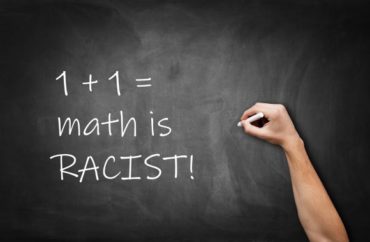
“Math equity” doesn’t mean 1 + 1 = 2.
The term refers to the growing insistence among educators that teaching math in the classroom comes with some inherently biased methodology that must be addressed.
Proponents of “math equity” also stress the importance of social justice issues such as race, diversity and gender in math education — a trend that’s catching on.
More professors and educators are tweeting under the hashtag #MathEquity to share strategies on the topic, and webinars and other pedagogical sessions on it abound.
“Equity-based mathematics teaching requires more than implementing new curriculum or using specific practices because it involves taking a stand for what is right,” the website for the National Council of Teachers of Mathematics states.
“It requires mathematics teachers to reflect on their own identity, positions, and beliefs in regards to racist and sorting-based mechanisms. It involves noticing students, learning about the worlds they live in, and building mathematics that comes from these worlds. And finally, it involves engaging other educators in partnerships to build equity-oriented communities.”
The council did not respond to requests from The College Fix for comment.
A 2018 column in Medium on math equity argues math equity must go beyond classroom teaching strategies. It argued math education is biased in favor of a Western narrative.
“The larger problem is that there are no readily recognizable names of non-white math leaders who are fluent in content and/or pedagogy,” writes Sunil Singh, who goes on to point out most celebrated mathematicians in the classroom are white: Pythagoras. Euclid. Descartes. Gauss. Newton.
“Every student of mathematics will come across the zero and the negative sign,” he states. “Yet, there is very rarely a mention of Brahmagupta in classes.”
“ … Calculus was a monumental achievement and deserves to have authorship recognized with Newton. But more students encounter the work of Brahmagupta than Newton. But, what if it wasn’t Newton that discovered calculus? What if it was Japanese scholar Seki Takakazu? We will never know. But the bigger idea is why couldn’t this be a possibility? Do we not want to be dislodged from the entrenched Western narrative?”
Meanwhile, there have been numerous online sessions and webinars to train teachers to adapt to an equity-based approach to math.
A recent online chat session titled “Diversity & Inclusion: Math ED Spaces” discussed on Twitter looked at a student’s sense of belonging and racial diversity in math education, according to a thread by one of the session’s participants.
“We heard … about creating a sense of belonging for students & teachers of color prompting us to become self-reflective of our work & take action,” tweeted Naomi Jessup, assistant professor of mathematics education at Georgia State University.
We applied @PedroANoguera tips for step in the pursuit of equity from @cultofpedagogy podcast. We heard from @TheJLV & @HKhodai about creating a sense of belonging for students & teachers of color prompting us to become self-reflective of our work & take action. #MathEdEquity 3/4
— Dr. Naomi Jessup (@mathedmatters) June 12, 2019
Jessup did not respond to The College Fix’s requests for comment.
The National Council of Teachers of Mathematics has also hosted math equity webinars.
In one 2018 webinar titled “Developing Social Justice Mathematics Activists in Pre-K-Grade 5,” its online description states that “when paired with issues of fairness, mathematics becomes a social justice tool that empowers students to mathematically recognize and address oppression they see in their own world.”
Some concepts of math equity are not all rooted in identity politics.
A recent tweet from Cathery Yeh, assistant professor of education at Chapman University, listed strategies for math equity on a whiteboard from a more objective view of student academic success, with ideas such as “give students time to think on their own” and “provide students with many different kinds of tools to help them discover their strategy or thinking.”
Other tweets on her account, however, favor math equity as a social justice tool.
Teaching math for social justice – this paper shares the process of analyzing school math curriculum as an entryway to engage elementary age students’ awareness around the hidden curriculum, transphobia, and genderism. .https://t.co/kl6SPTgBsh
— Dr. Cathery Yeh (@YehCathery) May 15, 2019
“Teaching math for social justice – this paper shares the process of analyzing school math curriculum as an entryway to engage elementary age students’ awareness around the hidden curriculum, transphobia, and genderism,” Yeh has shared.
MORE: Common Core Shock Video: 3 X 4 = 11
Like The College Fix on Facebook / Follow us on Twitter






Please join the conversation about our stories on Facebook, Twitter, Instagram, Reddit, MeWe, Rumble, Gab, Minds and Gettr.